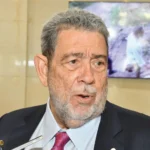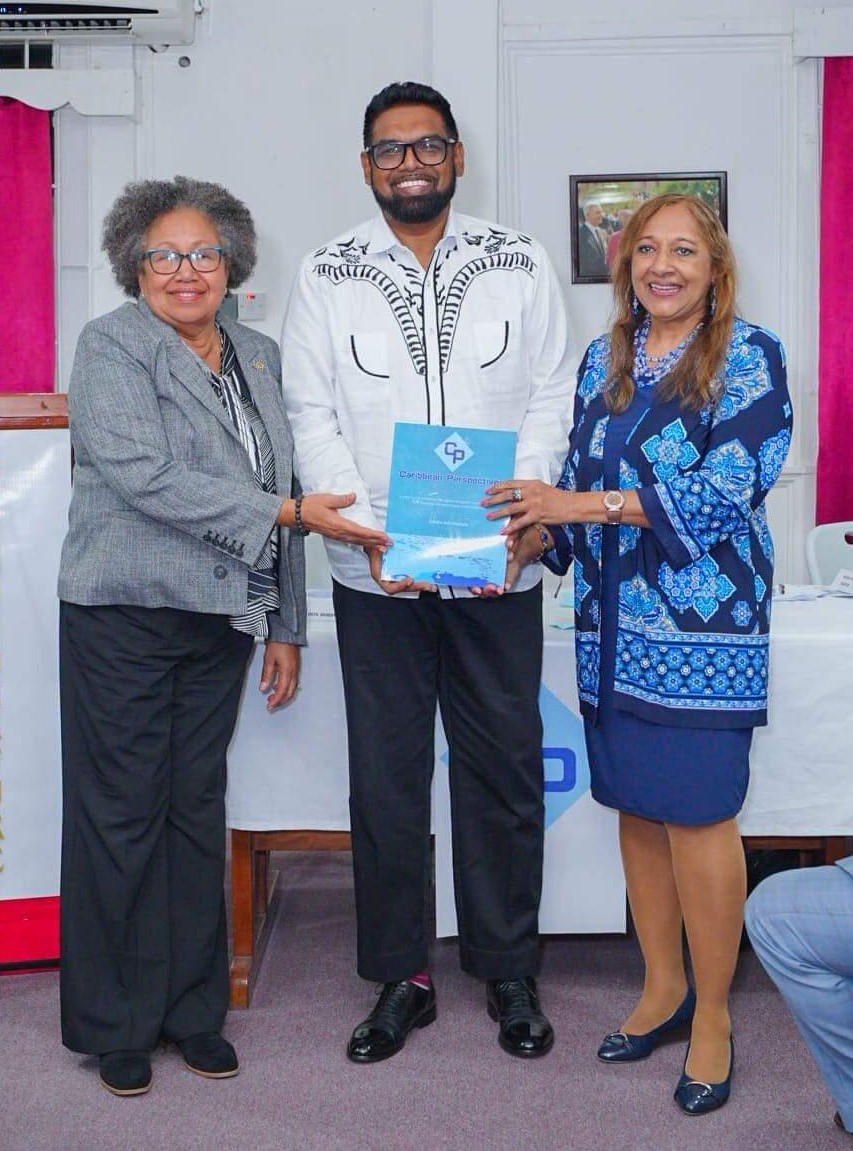Guyana’s President Irfaan Ali has launched a publication that chronicles major developments in CARICOM for over thirty years. The author of “Caribbean Perspectives” is former Caribbean journalist and specialist in Caribbean Affairs, Sandra Ann Baptiste, who is now a business and communications consultant. She is the Chief Executive Consultant of Florida-based Carigold Signature, which hosted the launch event.
Both President Ali and CARICOM Secretary-General Dr. Carla Barnett lauded the efforts of the author for putting together a comprehensive account of the early days of the regional integration movement with an extensive collection of articles, one-on-one -interviews with many regional leaders as well as material from radio and television broadcast programmes.
President Ali told the audience at the Cheddi Jagan Research Centre in Georgetown that the regional integration movement is currently in good hands as it is being led by a group of leaders who are committed to making CARICOM work.
“Caribbean Perspectives” features the views of over fifteen Heads of Government from across the region, business icons and civic leaders. Included in the publication are interviews and features with Guyanese Presidents Dr. Cheddi Jagan and Donald Ramotar; Barbadian leaders Sir Errol Barrow, Sir Bernard St. John and Sir Erskine Sandiford; Prime Ministers Michael Manley and P.J. Patterson of Jamaica, Dominica’s Dame Eugenia Charles, St. Lucia’s John Compton and James Mitchel of St. Vincent and the Grenadines.
The book has articles which focus on the many disappointments about the slow pace of integration, key integration issues, intra-regional trade concerns, strengthening regional links, national social and economic issues and tourism developments.
There is a section on Commonwealth issues with articles from Secretaries-General Sir Shridath Ramphal and Chief Emeka Anyaoku, as well as CARICOM Secretaries-General Roderick Rainford and Edwin Carrington.
“There are few better placed or informed to drive this task than Sandra Ann Baptiste, a committed regionalist with whom I have had the pleasure of sharing information and views since my earliest days in the engine room of the integration movement at the CARICOM Secretariat in the 1970s,” Carrington said in a message to mark the launch of the publication.
Rainford said Caribbean Perspectives is a highly commended historical document that will be of great interest to all who have followed the history of regionalism in the Caribbean. “The enormous task of producing these reports for over thirty years required tremendous research and is quite a labour of love that tells the story of the ebbs and flows of regional developments over that period”
The author said the book was produced to inform students across the region about developments in the earlier days of CARICOM, which is marking its 50th anniversary.
She presented copies of the book to the librarians of the University of Guyana and the Guyana National Library and said the publication will be made available to the University of the West Indies libraries. The book is also being provided to all the CARICOM heads of government.
In her address, Baptiste recommended that the current CARICOM leaders read the foreword in the publication written by former CARICOM Assistant Secretary-General Byron Blake, who was critical of the state of the integration movement.
The author suggested that Caribbean Heads of Government listen to people of the region to find out how they feel about the regional integration movement. “It is time for CARICOM leaders to consider a mini-West-Indian Commission.” She said they should also participate in call in radio and television programmes well in advance of the annual July CARICOM Summits to feel the pulse of the people on CARICOM.
Baptiste, who called for another CARICOM Tourism Summit, also said there is a need for both hassle-free and affordable intra-regional travel so Caribbean people can become familiar with other countries and people in the region.
The author stressed that for regional integration to be strengthened there needs to be a stronger relationship between the Caribbean media, the CARICOM Secretariat and the region’s leaders as there is cynicism about CARICOM at many media houses in the region.










